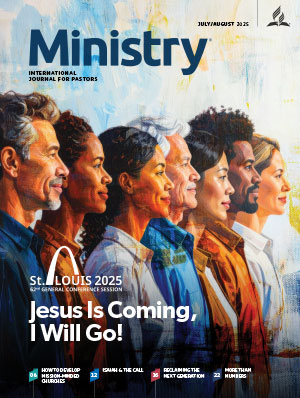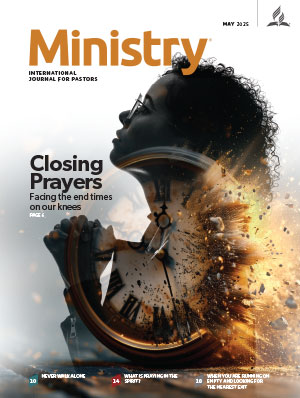Question: Did Sunday-keeping Methodists, Baptists, and others, led by a Baptist lay preacher named William Miller, say that Jesus was coming in 1844? Answer: Yes. While many Christians walked away from the prophetic aspects of Scripture because of the failed prophecy, other Christians studied to find out what the Bible really said about the time of the second coming of Christ.
These believers saw that no one would know the exact time when Jesus would come back but that it would be soon (Matt. 24:36). They also saw that His coming would be accompanied by a verdict (Rev. 22:12). The books of judgment would therefore be opened before Jesus returns to give us our reward—everlasting redemption or everlasting damnation (John 5:28; Rev. 20:12). But for right now, as they saw, Jesus is interceding for us in the most holy place of the heavenly sanctuary, and our only hope is total faith in Him (Dan. 8:13, 14; Heb. 8:1, 2; Acts 7:56; John 14:6).
These believers saw that humanity had been evicted from the tree of life for disobeying God’s commandments. However, humanity could be accepted at the tree by obeying God’s commandments (Rev. 22:14, KJV). They saw that it was futile to believe that the traditions of humans could ever replace the commandments of God (Matt. 15:9) and that it was futile to believe that some commandments were optional. “You can’t pick and choose in these things, specializing in keeping one or two things in God’s law and ignoring others. The same God who said, ‘Don’t commit adultery,’ also said, ‘Don’t murder’ ” (James 2:10, 11, The Message).
These believers saw that they had a duty to “prophesy again before many peoples and nations, and tongues, and kings” (Rev. 10:11, KJV). John characterized this prophetic message as three angels globally delivering “the everlasting gospel” (Rev. 14:6). These believers understood, “If anyone preaches any other gospel to you than what you have received, let him be accursed” (Gal. 1:9, NKJV). They realized that their message was to reemphasize the gospel in the context of time running out.
In 1863 these believers, from differing denominational backgrounds, called themselves Seventh-day Adventists.
At the beginning of time, the world was attacked by a serpent spewing an infernal threefold poison: passion, power, and pride (Gen. 3:6; 1 John 2:16). Praise God, there would be an inoculation: Jesus Christ the Righteous (Gen. 3:15; 1 John 2:1). And at the end of time, the world would be attracted by a church preaching an eternal threefold antidote: faith, hope, and love (1 Cor. 13:13; Rev. 14:6–13).
First angel’s message (Rev. 14:6, 7, 12)—the love of God
Choose love of God over love of the world. Love for God is expressed by obeying His commandments, including observing the seventh-day Sabbath, acknowledging God as Creator, and caring for ourselves and all of God’s creation, especially people who are oppressed (Isa. 58:6–8, 13, 14; John 15:13; 1 Cor. 6:18–20; 1 John 2:15-17; 4:20, 21; 5:3).
Second angel’s message (Rev. 14:8, 12)—the faith of Jesus
Choose trust in the sinless Savior over trust in sinful systems. Jesus’ perfect life, followed by His death and resurrection, qualifies Him as the one and only mediator between God and humanity. Trust in Jesus replaces our sinfulness with His righteousness, gives even the so-called worst of us grace to live free from sin’s addictions, and offers us abundant life in this world and eternal life in the world to come (John 3:16, 17; 10:10; 1 Cor. 6:9–11; 1 Tim. 1:15; 2:5; Titus 3:3–8).
Third angel’s message (Rev. 14:9–13)—the hope of the Holy Spirit
Choose the Holy Spirit’s seal over the devil’s mark. The seal or mark denotes whom you belong to—who/what you are holding on to or who/what is holding on to you. Jesus is about to come. Those who love and obey God will receive their reward—the disobedient will too. Hold on tightly to Jesus and His truth. This is our only hope (Ezek. 9:3-6; Matt. 25:41–46; Eph. 1:13, 14; 1 Thess. 5:19-21; Rev. 13:15-18; 22:11).
Together again
This everlasting gospel movement began with people from many denominations studying the prophetic word and embracing the commandments of God and the faith of Jesus (Rev. 14:12; 12:17; 19:10). That is how it will end. From the pulpit to the pew, men and women are choosing truth over tradition. Babylon—literal and spiritual—has indeed fallen (Rev. 14:8).
Congregations and clergy are coming out of Babylon (Rev. 18:4). Regardless of age, gender, race, or ability, total involvement is needed to preach and live out this everlasting gospel of love to all the world, because Jesus is about to come (1 Cor. 13:4-7; Gal. 3:28; Rev. 1:3). If you are a pastor reading this—from whatever denomination—the Lord needs you. It’s about time.














